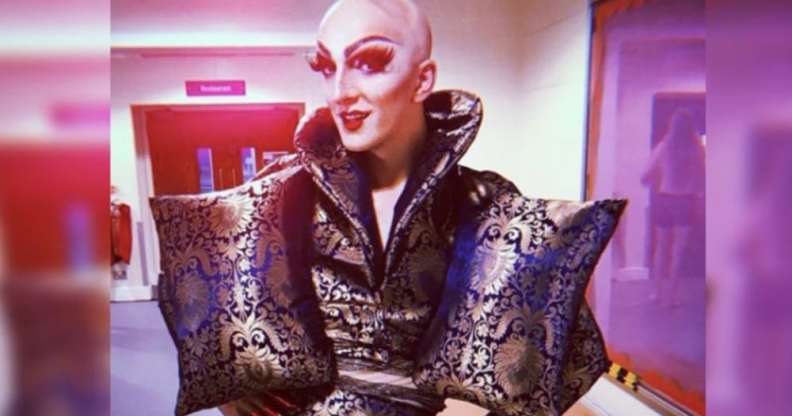Drag queen diagnosed with rare, terminal tumour pleads with government to do more for people like him

(Instagram/@eddieokadams)
Eddie Ruggiero was at the peak of his drag career when things started to go terribly wrong.
He entered the world of drag at 15, and by the time he was in his mid-20s he was making a living as the inimitable Eddie Adams, the classiest act on the Brighton circuit.
Things showed no sign of slowing when Eddie came third in an audition for RuPaul’s Drag Race, leading to more TV and film roles. But off-stage, things were beginning to crumble.
“I’d kind of always known that there was something going on in my head,” Eddie told PinkNews. “I’d always had migraines but I just didn’t have time to think about it.
“Gradually I was getting more of them, and feeling very lethargic, and sometimes there were gigs that I just couldn’t do because I had such a terrible headache.”
Eddie prided himself on a witty repartee that would have even the straightest of skinheads in hysterics, but when it became hard to form full sentences he knew something was seriously wrong.
It all came to a head in 2017 when he collapsed with a seizure the weekend of Brighton Pride. Doctors diagnosed him with a rare and devastating brain tumour known as anaplastic astrocytoma.
He was 29 years old; he was told he wouldn’t live to see 35.
View this post on Instagram
At the time, Eddie simply took it in his stride. “I was a bit taken aback, but I also remember feeling almost a sense of relief to finally have an explanation,” he recalled.
“Ever since I was a child being a drag queen was what I wanted to do, and I just didn’t know what was going wrong because that was my dream. I thought it was an issue with me.
“I suppose in the back of my head I was thinking I’ll still do drag, but as time went on I realised you can’t really do anything when you’re going through the treatment. They’re talking about cutting your head open so you can’t exactly put a wig on.”
Eddie remained upbeat even as doctors performed a craniotomy operation to remove the tumour – while he was fully conscious. Afterwards he had to remember how to speak, how to brush his teeth, how to write his own name.
The surgery seemed to go well, but two weeks later he was rushed back to hospital with a life-threatening infection. Doctors had to remove part of his skull, leaving his head permanently misshapen.
“Almost immediately I’d accepted the fact that I had a brain tumour and I had three to five years to live. But I think the second operation really screwed me,” he said.
“I essentially went from being quite a successful being a drag queen, to being absolutely ruined, really. That’s kind of when it hit me. Everything I thought my life was going to be is literally in tatters.”
View this post on Instagram
It’s a devastation familiar to more than 100,000 patients and families in the UK affected by brain tumours, the biggest cancer killer of children and adults under the age of 40.
Like so many others Eddie found his options were limited. He was offered a course of radiotherapy and chemotherapy, the same treatment regime that’s been used for decades.
Part of that is down to underfunding. Since 2002, £680 million has been invested in breast cancer while just £96 million has been spent on brain tumour research, a difference of £35 million a year over 17 years.
This disparity continues with brain tumour research spend receiving £35 million a year less over the last three years.
“It’s stunning how much doctors are not aware of because they don’t have the clinical trials to inform their treatment,” Eddie said.
Now as he nears the end of his life, he’s calling on the government to commit to greater investment for brain tumour research, giving it funding parity with other forms of cancer.
“As long as the research is being done, that’s all you can ask for,” he said. “I’m not expecting miracles to happen, we’re not suddenly going to get loads of treatment options. But the treatment they did for me was the same thing they did 20 years ago.
“I just think you’re never going to be able to discover those treatment options until there’s more research being done.”
More than 112,000 people have signed an urgent petition calling for increased funding presented to MPs on 22 April, along with a report demanding the government “level up” on brain tumour investment.
In March, Boris Johnson told the House of Commons that the government had already promised an investment of £40 million – but three years into the five-year period over which the funds were promised, only £9 million has actually been allocated.
If and when the investment finally comes, it will sadly be too late for Eddie.
There are good days, and there are the bad days when his pain becomes too great and he feels he just can’t go on – but he does.
“It’s other people that keep me going,” he said. “I’m very lucky, and I see that, and I’m very privileged. I can’t imagine what it would be like for someone that didn’t have the kind of support system that I have going through this.
“And I suppose ultimately, that’s the person that I’m doing all of this for. I’m campaigning for people who are in an even worse circumstance than myself.”

